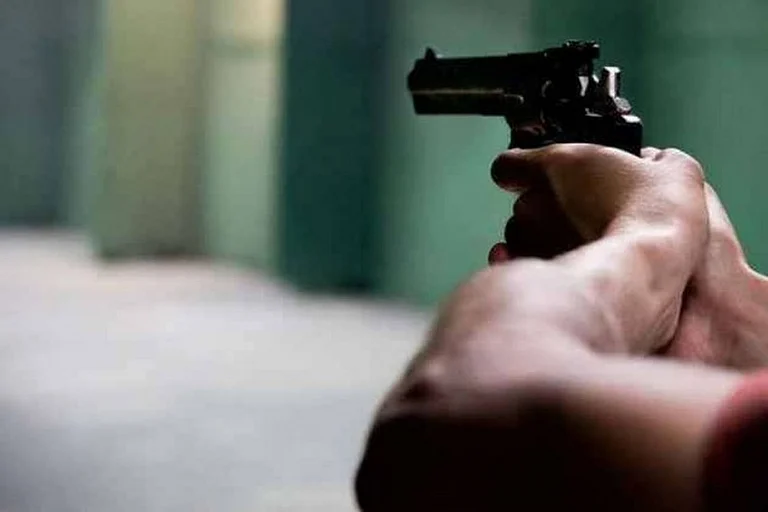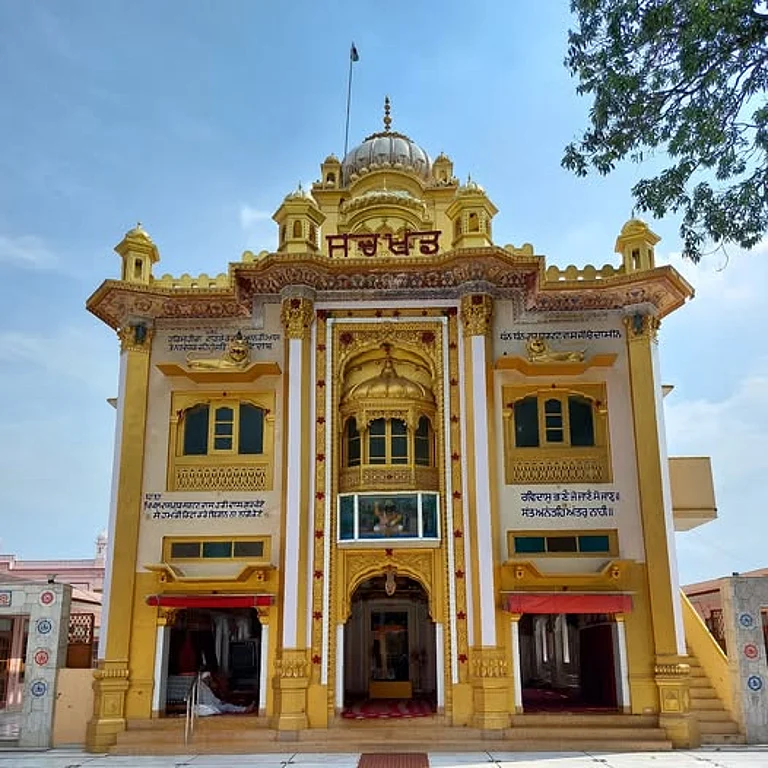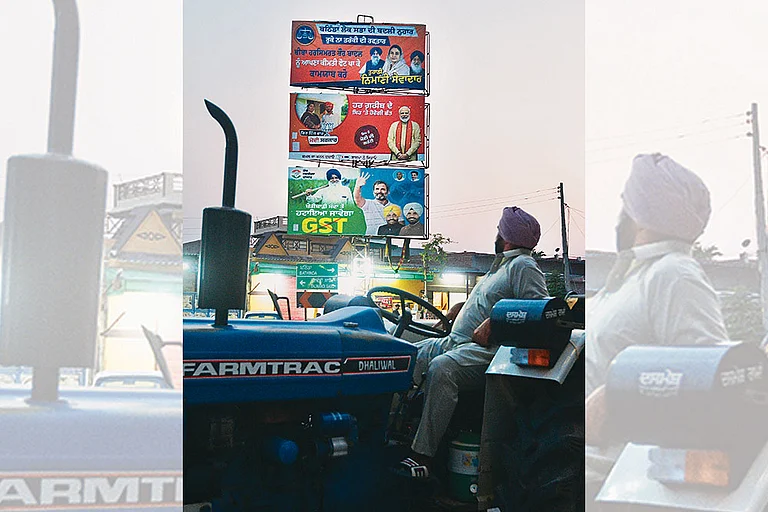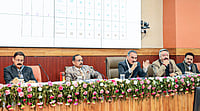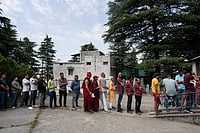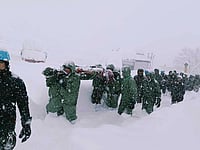For all those who drive through busy Nakodar Chowk in Ward no 54 of Jalandhar, Punjab, what meets the eye is not the ‘hustle and bustle’ of modern life but a sluggish and dull semblance, typical of a suburban town. This is quite a contrast to the dynamic transformation that Jalandhar – one of the largest cities in Punjab’s Doaba region – has otherwise seen, blending modernity with its ancient heritage.
Behind the old heavy wooden doors of old homes-cum-work-areas are sprawling godowns opening to closed verandas. The premises double as storage places stocked with raw hides and dry animal skins. The doors usually remain closed to prevent the stench from spreading.
The deserted shops and marketplaces, however, tell a heartbreaking story of despair and dejection.
Seth Satpal Mull, 70, can barely speak with clarity, or walk. He carries a walking stick. Even to step out of his living room, he needs a helping hand. As he faces the heat in the verandah, a girl (possibly his granddaughter) hands him some medicine pills. She then quickly brings a tiny water bottle. This is an essential medicine dose that he can’t miss to keep his blood pressure and sugar in order.
As he begins talking, neither his faltering speech nor restrictive mobility stops him from stirring a few emotions which are beyond the confines of language or his Punjabi dialect.
This is in Jalandhar’s 'Bootan Mandi', once a bustling relic for the raw leather business since the British era. Mull points out towards the market, takes a pause and begins to describe his despair.
“I am a third-generation person in this business as a trader. Our annual turnover was annual turn-over was Rs 200 crore till the 90s. We were also into exports to China. Domestic supplies were made to places like Kanpur, Kolkata, Madras and also within Punjab. Today, I am sitting idle. The business is equal to zero,” he says, pointing to an empty godown.
As our photographer took his nod to walk inside the godown, in the hope of clicking some pictures, he returned in disappointment. There is no activity inside. Barring a few dry rawhide dumps, there was nothing to photograph. Some years back, when he came on an earlier assignment, a lot of traditional leather craft-persons were at work.
The vibrant leather market—Bootan Mandi, one of three major business centres in India (beside Kanpur and Calcutta) dates back to the colonial era. Today it is in dire straits.
There are no buyers of raw leather and animal hides, which used to have a large demand in the leather industry, including Jalandhar’s homegrown tanneries, leather processing units and footwear industry.
Even the families, who belong to scheduled caste communities were into leather works. Collecting hides from villages, skinning dead animals and thereafter selling wet hides at Bootan Mandi was a decade-old tradition. However, the work has now become completely unviable to sustain their families. Many of them are slowly giving it up.
“Come to the morning market where these people (the rawhide collectors) bring raw hides for sale to leather merchants. You will know the hard reality. The poor people, who come from villages in Punjab, Himachal, Haryana and Jammu carrying raw hides hardly get buyers. The price they get does not even cover the transportation cost, it is hardly commensurate with their hardwork,” Mull says.
Truly so, the morning market – an open space with a partially covered roof and a rear wall adorned with photographs of Dr BR Ambedakar and Babu Kanshi Ram – is testimony to agony and anguish prevalent within the Dalit community, primarily of Ravidassias, involved in the raw leather business. Ravidassias is a sub-caste of the scheduled caste population in Punjab that has a large presence in the Doaba region but never gets a voice in politics.
Congress leader Charanjit Channi, who rose to become Punjab’s first Dalit Chief Minister ahead of 2022 state assembly polls – an experiment which did not work despite Punjab having the highest share of Dalits, in its population among all states. He contested two seats simultaneously but lost both.
“This is the result of fragmentation of the Dalit votes,” says Kamal Kler of Bootan Mandi, who is a BSP sympathiser.
Shadi Lal Kler, who has seen the morning leather market for 35 years from good times to present crisis says, “The business has been in ruins ever since the BJP has formed the government at Centre. They stopped supporting this small-scale industry. There is no hope for its revival. The future is not secure for the people in this business.”
The roots of this distress are attributed to a vital shift in the Punjab’s changing lifestyle in the villages. The farmers have stopped rearing the cattle – both buffalos and cows. The animal population had come down drastically. The Dalit community traditionally engaged in skinning of dead animals has no work. The younger generation is not ready to take up family traditions. They look for greener pastures in cities outside Punjab.
“Moreover the village panchayats have banned skinning of the dead animals, which are now usually buried instead,” Kler says. Also, the places traditionally earmarked for skinning of dead animals in rural areas have been encroached upon, leaving no space for this job.
Another reason is the growing activism and violence inflicted on people transporting wet skins and animal hides to the markets. The boys, usually lower-caste Dalits, often get frequently attacked and assaulted. The activists—the cow vigilantes, Hindu organisations and VHP functionaries, don’t allow movements of raw material suspecting them of animal smugglers or those engaged in illegal slaughtering of cows and buffalos.
Ravi Suman, 45, who is a second-generation trader, in the leather business at Bootan Mandi says their turnover was Rs 60 crore before the year 2020. During the Covid pandemic, the leather industry was shut down. The stock of raw skins started rotting in godowns and eventually destroyed.
Jalandhar, once bustling with a leather business that existed at the time of Britishers, is passing through its critical period. The exports are down and the domestic market is sluggish. The craft persons, mostly living at Bootan Mandi, are diversifying and picking up different means of livelihood. The families involved in the leather business have quit and moved out to other places.
He points out that of 130-135 leather units at 210 acre Leather complex on Kapurthala road, there are only 40 odds left. These too are running at a capacity of 25 per cent. The leather tanneries have been shut down following a Punjab and Haryana High Court order in a case relating to industrial pollution.
A Rs 60 crore proposed Common Effluent Treatment Plant sanctioned by the Centre is in limbo as the state government did not release its share of 15 per cent. The other 15 per cent contribution by the leather industry has also not happened. The industrialists have no funds to pool their share.
Amandeep Singh Sandhu, President of the Leather Industrial Association says, “The leather industry, Rs 2,000 crore iconic business landmark of Jalandhar, is passing through tough times. More than 2,000 workers, involved in direct and indirect employment have no means. The families at Bootan Mandi – both craft persons, small traders and labour, face an uncertain future.”
He claims that some of the popular leather brands engaged in the manufacture of shoes, footwear, bags, belts, jackets and accessories have shut their shops.
Nevertheless, Jalandhar holds a special place for Indian cricketers like Harbhajan Singh, film actors including Suniel Shetty and politicians like Bhagwant Mann for buying leather footwear locally. Jalandhar is also a hub of sports goods promoted by top Indian cricketers like Kapil Dev, Harbhajan Singh and Sachin Tendulkar.
“Bootan Mandi has played a significant role in the local economy by providing employment opportunities to a large number of people involved in leather processing, manufacturing, and retail. But, now dying a slow death,” rues Jagdish Chander, admitting that his family was part of the Bootan Mandi leather business. They were also followers of Satguru Ravidass.
It is said that Bibi Nooran, a folk Punjabi singer in the 1970s, was also a resident of Bootan Mandi. She was married to Ustad Sohan Lal. She is the Grandmother of the famous Sufi singers Nooran Sisters.
Sufi singer Hans Raj Hans, whose song "Sohna Punjab da shehar Jalandhar, Bootan Mandi Jisde Andar” has been quite popular in the community.







